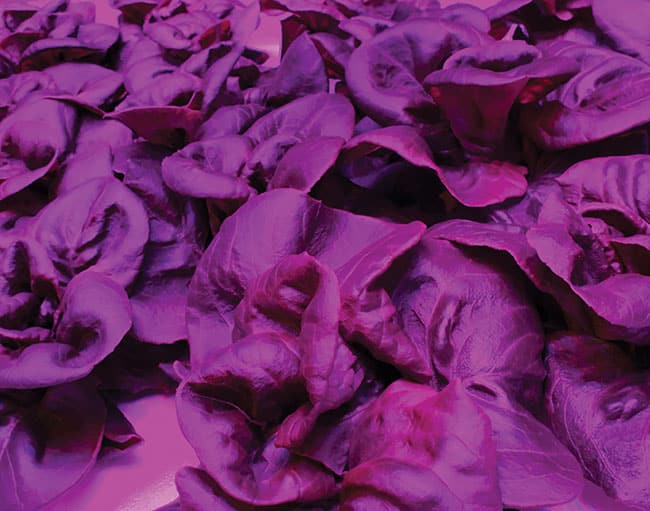
Technically Speaking: Futuristic Light(ing) in Horticulture
The science and engineering of crop production continues to advance with new or more effective technologies. This is especially true with the production of specialty crops inside greenhouses and indoor (vertical) farms. There have been significant developments in the most important — and often the most limiting — factor for plant growth: light. While light- emitting diodes (LEDs) are leading the way (and arguably advancing the most rapidly) there are other technologies that supplement or modify the solar spectrum that could also have applications in horticulture.
LEDs
LEDs have become the primary fixture type for new greenhouse lighting installations and the dominant lighting technology for indoor farms. Their efficacy of converting electricity into photons for plant growth has increased dramatically, as has their light output, stability and reliability.
Cost (on a light output basis) has also decreased over time. However, there are still opportunities for improvements in LED lighting in horticulture, including:
- New phosphors and combinations. Most white LEDs are blue LEDs covered by a material that down-converts much of the blue light into longer wavelengths (green and red light). These materials, called phosphors, continue to be refined. Specific objectives include developing a semi-tunable emission spectrum and increasing the color- rendering index (CRI). For example, white LEDs can be developed to have a specific tint (such as a greenish-white color) that when combined with red LEDs can improve the efficacy and/or CRI of an LED fixture.
- More efficient and thermally stable. LED fixtures are much more effective than conventional lighting fixtures, but the magnitude varies dramatically from one product to another. LED efficiency continues to improve, although most of the possible gains have already been achieved in some of the newest products. Still, efficiency improvements of at least 10 to 15% are realistic in the next several years.
- Ultraviolet (UV) light. Potential applications for UV LEDs in horticulture include suppression of pathogens and sanitation/sterilization. LEDs on
the market today that emit UV light are generally expensive, inefficient and have a short lifetime. However, meaningful developments are being made primarily because of demand to kill viruses related to the recent pandemic.
ORGANIC LEDs
Organic LEDs (OLEDs) contain thin layers of organic compounds sandwiched between two thin-film electrodes, which emit light when energized by electricity. In contrast, “regular” LEDs have positive and negative regions and light is emitted when an electric current flows from one end to the other.
OLEDs are commonly used in digital displays such as television screens and smartphones, but their application in horticulture is limited because of their relatively low light output.
There are transparent OLEDs that (as the name implies) allow most light to pass through them, and conceivably could be developed into a greenhouse glazing or shading material.
While conceptually interesting, cost and low output of light are significant barriers to commercialization of this specific application.
QUANTUM DOTS
Quantum dots are microscopic particles or crystals (millionths of a millimeter in diameter) that semi-conduct electricity and emit specific wavelengths (colors) of light when excited by more- energetic light or electricity. Quantum dots have a variety of applications and, in horticulture, can be incorporated into plastic materials (films or sheets) to modify the solar spectrum.
In particular, quantum dots can be used to convert a portion of the high-energy photons (UV and blue light) from sunlight into less-energetic, longer-wavelength photons (usually red and far-red light).
UV and blue light typically suppress extension growth of plants, and thus plants may be slightly taller and/or have larger leaves under a solar spectrum modified by quantum dots. This can increase the light capture of plants and increase overall plant growth, but at the expense of compactness, which is often a desired trait for ornamentals.
A challenge with quantum dot films is that they decrease overall light transmission, and thus are likely more suitable for regions with relatively high light levels. The incorporation of quantum dots into greenhouse glazing materials (potentially combined with photovoltaics) is conceptually very interesting.
IMAGE ABOVE: In addition to LEDs, there are other technologies that supplement or modify the solar spectrum that could also have applications in greenhouses and indoor farms.
Erik Runkle is professor and floriculture extension specialist in the department of horticulture at Michigan State University. He can be reached at runkleer@msu.edu.


 Video Library
Video Library 




















